Summary
The Arizona Paycheck Calculator helps employees and employers estimate take-home pay by factoring in gross income, tax withholdings, and deductions specific to Arizona. Users input details like pay frequency, filing status, and pre/post-tax deductions to calculate net pay. The tool accounts for Arizona’s tiered income tax, federal taxes (FICA), bonuses, and overtime. It’s useful for budgeting, payroll planning, and verifying paycheck accuracy. Understanding your paycheck also helps with tax filing and avoiding under- or over-withholding. Employers must comply with Arizona payroll laws, including pay frequency and final paycheck timelines.
Managing your finances starts with understanding exactly what you take home. The Arizona Paycheck Calculator helps employees and employers accurately estimate net pay after taxes and deductions. Whether you’re budgeting your monthly income or managing payroll, this tool provides quick and reliable results tailored to Arizona’s tax regulations.
What Is the Arizona Paycheck Calculator?
The Arizona Paycheck Calculator is an online tool designed to estimate your take-home pay based on your gross income, filing status, number of dependents, and additional deductions. It reflects Arizona’s state tax structure and federal income tax laws, providing a comprehensive overview of your paycheck. It’s ideal for employees, freelancers, HR teams, and small business owners.
Why Use a Paycheck Calculator for Arizona?
Arizona has its own income tax rates and withholding rules, making it essential to use a state-specific calculator. Using a generic tool may lead to inaccurate estimates. With an Arizona-focused calculator, you can:
- See real-time estimates of your take-home pay
- Understand how taxes and deductions affect your earnings
- Plan for financial goals like saving, budgeting, or adjusting withholdings
- Ensure payroll compliance if you’re an employer
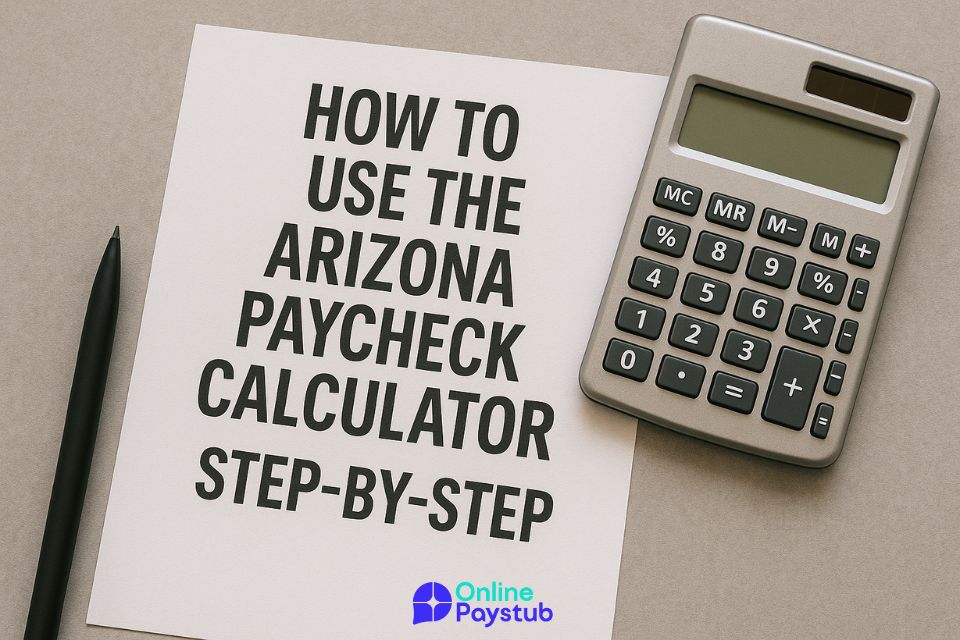
How to Use the Arizona Paycheck Calculator Step-by-Step
Using the Online Pay Stub’s Arizona Paycheck Calculator is simple and only takes a few minutes. Here’s how it works:
- Enter your gross pay – Input your total earnings before taxes.
- Select your pay frequency – Choose weekly, biweekly, semimonthly, or monthly.
- Add filing status and dependents – Indicate your federal filing status and how many dependents you claim.
- Include pre-tax deductions – Enter health insurance, 401(k), or HSA contributions.
- Input post-tax deductions – List garnishments or other after-tax amounts if applicable.
- Click “Calculate” – The tool will instantly generate your estimated take-home pay, with a breakdown of state and federal deductions.
Key Inputs: What You Need Before You Start
Before using the Arizona Paycheck Calculator, gather the following details to ensure accurate results:
- Gross pay amount (hourly wage or salary)
- Pay frequency (weekly, biweekly, monthly, etc.)
- Federal filing status (single, married, head of household)
- Number of dependents or allowances
- Any pre-tax deductions (retirement plans, health insurance)
- Post-tax deductions (garnishments, union dues)
- Bonuses or overtime pay if applicable
Having this information ready helps deliver a precise estimate tailored to your personal or employee situation.
Understanding Arizona Income Tax and Withholdings
Arizona applies a tiered income tax rate, which ranges based on annual income. In addition to federal tax withholdings, state income tax is deducted from your paycheck. The percentage withheld depends on the amount you choose on Arizona Form A-4, which offers multiple withholding rate options. The calculator incorporates these percentages to ensure your estimate matches real paycheck deductions.
Federal vs State Taxes: What’s Deducted from Your Paycheck
Your paycheck includes multiple layers of taxation:
- Federal Income Tax: Based on your filing status and allowances.
- FICA Taxes: Social Security (6.2%) and Medicare (1.45%) apply to all earnings.
- Arizona State Tax: Withheld at a rate you select on Form A-4.
- Other Withholdings: May include retirement, insurance, or local taxes.
The calculator clearly separates federal and state deductions, giving you a transparent view of where your money goes.
Adjusting Pre-Tax and Post-Tax Deductions
To get the most accurate take-home pay estimate, include deductions such as:
- Pre-tax: 401(k) contributions, HSA plans, dental/vision insurance
- Post-tax: Child support payments, wage garnishments, charitable deductions
Reducing your taxable income through pre-tax deductions can increase your net pay and lower overall tax liability.
How Overtime and Bonuses Affect Your Arizona Paycheck
Overtime, commissions, and bonuses are taxed just like regular income, though they may push you into a higher tax bracket temporarily. The calculator accounts for these variables by allowing you to enter extra income on top of your base salary. This ensures a more accurate reflection of how supplemental earnings affect your paycheck.
Planning for Accuracy: Filing Status, Allowances, and More
Your federal filing status (single, married, etc.) and number of dependents impact your federal withholding. Additionally, choosing the correct Arizona withholding percentage on Form A-4 helps avoid under- or over-withholding. Always keep your W-4 and A-4 forms up to date to reflect changes in your personal or financial situation.
Using Your Paycheck Calculator Results for Budgeting
Once you’ve estimated your take-home pay with the Arizona Paycheck Calculator, use the results to build a more accurate personal budget. Allocate your net income across essential categories like:
- Housing and utilities
- Transportation and fuel
- Groceries and essentials
- Debt repayment (credit cards, loans)
- Savings and retirement contributions
By understanding your actual earnings after taxes and deductions, you can avoid overspending and plan more confidently for both short-term and long-term goals.
Can You File Taxes Without a W-2? What to Know
While the W-2 is essential for most employees, if you haven’t received one, you can still file taxes using Form 4852 as a substitute. This form requires an estimate of your earnings and taxes withheld, which can be calculated using:
- Your final pay stub of the year
- Records from your employer
- Your paycheck calculator results
However, always attempt to get your W-2 first, and only file with Form 4852 as a last resort. If your employer doesn’t provide it, you can also contact the IRS directly after February 15.
Best Practices for Checking Your Pay Stub Against the Calculator
To ensure accuracy, compare your paycheck calculator output with your actual pay stub by checking:
- Federal and state tax withholdings
- FICA contributions
- Pre-tax and post-tax deductions
- Net pay
If you notice discrepancies, verify your W-4 or A-4 selections and consult your HR department. Consistently comparing stubs with estimates is a smart way to catch errors or unexpected changes in your withholdings.
Arizona Payroll Laws: What Employers and Employees Should Know
Arizona’s labor laws and payroll regulations include:
- Minimum wage: Adjusted annually based on inflation
- Pay frequency: Employers must pay at least twice a month
- Final pay: Must be paid within 7 working days after separation
- Deductions: Must be lawful and authorized by the employee
Employers must also provide clear pay statements, and employees have the right to request wage details. Staying informed helps both parties remain compliant and avoid penalties.
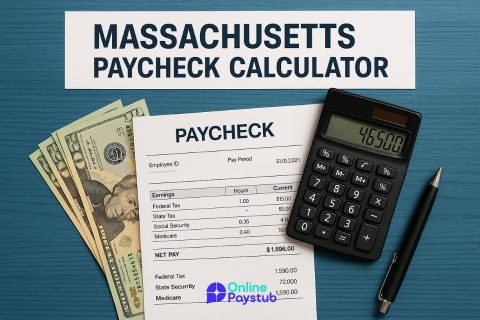
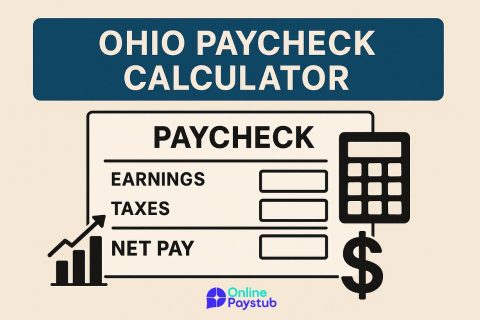
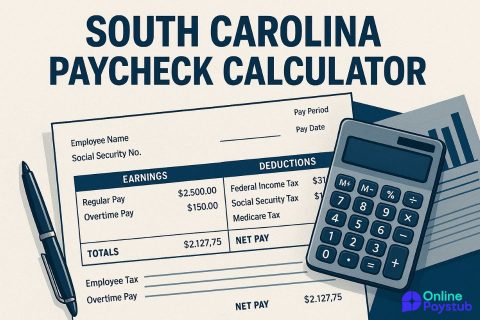
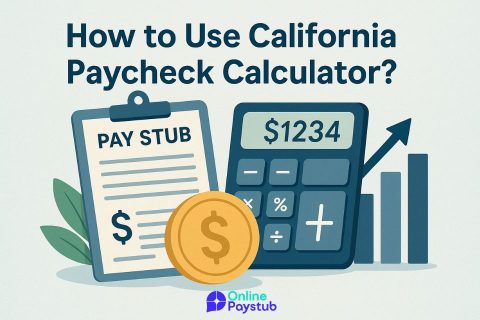
No comments to show.